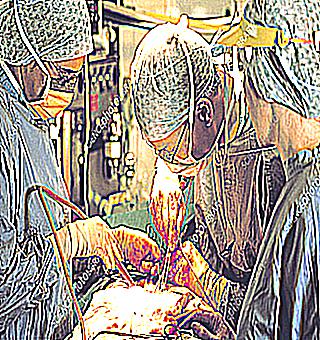Home >
Erectile Dysfunction >
Impotence after prostate surgery
Impotence after prostate surgery

In modern medicine, several types of operations are used to treat or remove the prostate. Performing manipulations in the perineal area is a serious traumatic factor and temporarily destabilizes the male hormonal background. Surgical intervention can cause a loss of sexual attraction to the opposite sex and necessitate treatment by an andrologist.
Basic surgical methods
To help patients with lesions of the prostate gland, surgeons usually use: 1. prostatectomy 2. resection of the prostate 3. drainage of abscess
Prostatectomy
An intervention performed under general anesthesia involves the complete removal of the prostate gland. As a result of treatment, the blood supplying vessels are cut off from the prostate, the seminal vesicles and regional lymph nodes are removed. Prostatectomy is performed by strip and endoscopic methods. Lane surgery means the incision of the perineum or the lower part of the anterior abdominal wall with a scalpel. After completing all the necessary manipulations, the doctor applies 10-12 sutures, which are removed after a week. During endoscopic prostatectomy, a series of punctures are made in the abdominal wall through which a camera, coagulator and light are inserted. The endoscopist monitors the course of the operation through a monitor. After the intervention, 1 suture is applied to the puncture sites and a day later the patient returns to his usual rhythm of life.
Prostate resection
The operation consists in removing part of the prostate gland. Resection is performed laparoscopic, suprapubic or transurethral.
Abscess drainage
It is performed with the aim of eliminating inflamed cavities filled with purulent contents. The manipulation is carried out by the drainage method. The main instrument is a puncture needle. The impact is performed under the control of ultrasound.
Indications for surgery
The need to use certain surgical methods of treatment arises when it is detected in men:
- emergency conditions and complications of prostatitis
- growth of abscesses, including purulent ones
- active inflammatory processes in the pelvic area
- blood clots in urine
- urinary retention or no urination
- bladder or kidney stones
- benign hyperplasia and malignant neoplasms
- urethral obstruction
- enlarged prostate
Possible complications
After the operation, male patients suffer from a number of complications, namely:
- from bleeding during urination, stricture formation, infection and shortening of the urethra
- from retrograde ejaculation (abnormal discharge of semen into the bladder) or impotence
- from salt disorders balance and deterioration of well-being
- from urinary incontinence
- from the formation of a urethrorectal fistula
Recovering from prostate surgery
The probability of retrograde ejaculation occurs in 50-80% of operated patients. Approximately 10-15% note a decrease or complete loss of sexual potency. Restoration of sexual performance after surgical treatment of the prostate gland is possible with proper recovery and receiving professional medical treatment.
Rehabilitation after prostate surgery
After performing surgery in the perineal region, patients should adhere to the following recommendations:
- get plenty of fluids and a balanced diet
- exclude sudden movements and excessive exertion
- take antibacterial drugs
- undergo regular examination by your doctor< / li>
- refrain from sexual intercourse for 30-50 days after the operation
- perform the complex of therapeutic exercises recommended by the doctor
- receive medication and physiotherapy
Increased potency after prostate surgery
Potency after partial removal or drainage usually recovers within 2–3 months of surgery. After such a serious operation as radical prostatectomy, many men need to undergo a full-fledged treatment course. Pharmacological agents with the addition of vardenafil, sildenafil and tadalafil demonstrate great efficiency in increasing sexual desire. Medicines stimulate the production of erection mediators, improve local blood flow and eliminate signs of destabilization of sexual ability. Temporary drugs help men overcome the psychological barrier that arises after major surgery and return a high level of sexual activity.



























